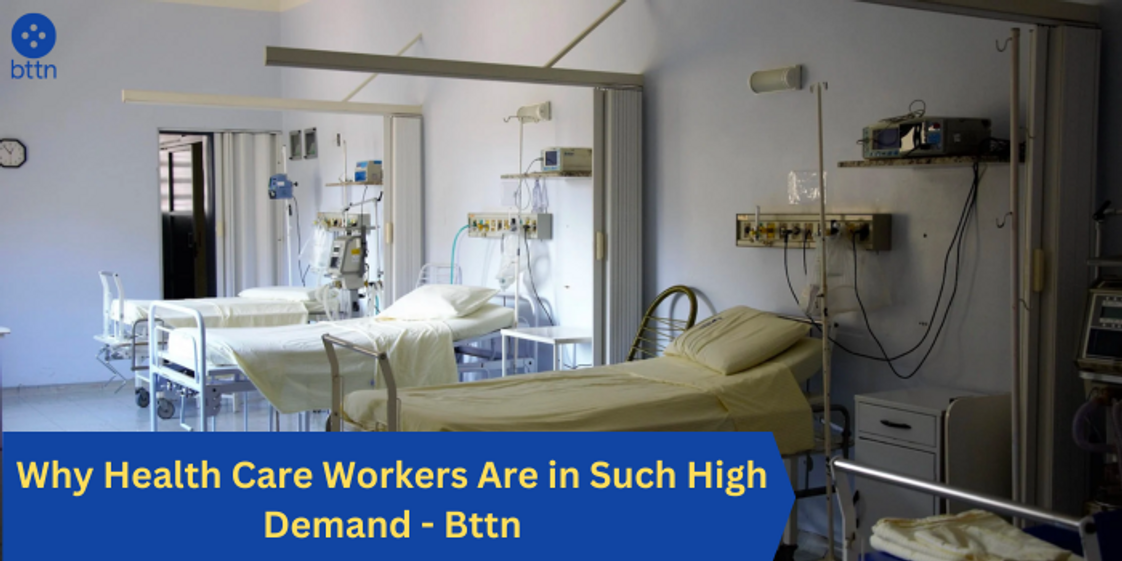
Why Health Care Workers Are in Such High Demand - Bttn
Posted by Pankaj Dhiman on Sep 28th 2023
Navigating the Demands of a Healthcare Career: Challenges and Rewards
When it comes to pursuing a career in healthcare, whether you're in the United States or anywhere else in the world, you're signing up for a rewarding but incredibly demanding journey. The healthcare industry plays a crucial role in society, providing essential services that impact lives every day. In this blog, we will explore the challenges and rewards of becoming a healthcare worker in the US, shedding light on critical aspects of this noble profession.
Education and Training
Becoming a healthcare worker in the US typically begins with a solid educational foundation. To step into this field, you'll need to complete a rigorous program in a healthcare-related discipline. This often entails earning a Bachelor of Science in Nursing (BSN), a Doctor of Medicine (MD), a Doctor of Pharmacy (PharmD), or other specialized degrees, depending on your chosen path.
The educational journey is challenging, requiring a commitment to years of study and practical training. However, it's a necessary step to prepare you for the responsibilities you'll shoulder in your future healthcare career.
Licensing and Certification
After completing your education, you'll face the next hurdle: obtaining the necessary licenses and certifications. In the US, healthcare professionals are required to pass rigorous licensing exams, which vary depending on the specific profession. For instance, nurses must pass the NCLEX-RN exam, while physicians must complete the USMLE.
The process can be demanding, involving extensive preparation and dedication. Nevertheless, it ensures that healthcare workers meet the high standards necessary to provide quality care to patients.
Long Working Hours
Once you've successfully obtained your license, you'll find that a healthcare career often means long working hours and irregular shifts. Healthcare facilities operate around the clock, and healthcare workers are required to be available during weekends, holidays, and even overnight.
These demanding hours can take a toll on your work-life balance and personal life, but they are an integral part of ensuring that patients receive the care they need 24/7.
Emotional Toll
One aspect of a healthcare career that many people underestimate is the emotional toll it can take. Healthcare workers often deal with life and death situations, serious illnesses, and distraught families. Witnessing suffering and loss can be emotionally taxing.
Moreover, healthcare workers may face ethical dilemmas, such as deciding on treatment options or handling end-of-life care. Coping with these emotional challenges is an ongoing process, and many healthcare institutions offer support services for their staff.
Physical Demands
In addition to the emotional toll, a healthcare career can be physically demanding. Nurses, for example, may need to lift and move patients, which can lead to back and musculoskeletal issues if proper techniques aren't followed. Physicians may experience fatigue from long surgeries or rounds.
To thrive in this profession, maintaining good physical health and practicing self-care is essential. Healthcare institutions also emphasize the importance of workplace safety to minimize the risk of physical strain and injuries.
Continuous Learning
The healthcare field is ever-evolving, with new treatments, technologies, and research emerging regularly. Healthcare workers are expected to engage in continuous learning to stay current in their respective fields. This involves attending workshops, seminars, and pursuing further education if necessary.
While this commitment to lifelong learning can be challenging, it also keeps healthcare workers at the forefront of medical advancements and ensures the best possible care for patients.
Rewarding Aspects of a Healthcare Career
Despite the many challenges, a healthcare career in the US offers numerous rewards that make it a highly fulfilling profession.
Making a Difference
One of the most rewarding aspects of healthcare is the opportunity to make a significant difference in people's lives. Healthcare workers play a vital role in alleviating pain, saving lives, and improving the overall well-being of patients.
Job Security
Healthcare is a recession-resistant industry. The demand for healthcare services continues to grow with an aging population, making it a stable career choice. Job security is a valuable aspect of any profession.
Financial Stability
Healthcare careers often come with competitive salaries and benefits. While the exact compensation varies depending on the profession and location, healthcare workers tend to enjoy financial stability, which is essential for a comfortable life.
Diverse Career Options
The healthcare field offers a wide range of career options. Whether you aspire to be a surgeon, pharmacist, nurse, or therapist, there's a healthcare career path that aligns with your interests and strengths.
Personal Growth
A healthcare career provides opportunities for personal growth and development. As you gain experience and expertise, you can take on more significant roles, mentor others, or even contribute to research and advancements in your field.
Conclusion
Becoming a healthcare worker in the US is undoubtedly demanding, with challenges that encompass education, licensing, long hours, emotional strain, and physical demands. However, the rewards are equally significant, from the ability to make a difference in people's lives to job security, financial stability, and personal growth.
If you are considering a healthcare career, it's crucial to weigh both the challenges and rewards. It's a path that requires dedication and resilience, but it's also one that offers immense satisfaction and the opportunity to contribute positively to society.
In the end, the decision to pursue a healthcare career should align with your passion for helping others and your willingness to face the demands of this noble profession. Despite the challenges, many healthcare workers find their careers to be deeply fulfilling, knowing that they are an essential part of a system that promotes health and well-being in the US and beyond.
